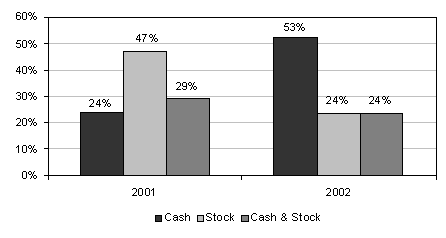|
|
| Home - Software M&A Review - Feb 03 Issue |
Software M&A: 2002 - A Year in Review
continued... page 3 |
Cash remained king during the fourth quarter, particularly among buyers with strong balance sheets who refused to use deflated stock as currency. 65% of buyers used cash, 14% used stock, and 21% a combination of cash and stock. For the year, 53% of acquisitions were funded with cash, 24% with stock and 24% with cash and stock. Unsurprisingly, this is a substantial change from 2001, when stock was the prevalent currency (see Figure 8).
Figure 8: Software M&A – Form of Payment

Buyers were cautious and more narrowly focused in 2002. Few relied upon acquisitions to fundamentally alter their business models or markets. Rather, acquirers were much more tactical, targeting small and midcap companies which complemented their core businesses by filling product, technology and market gaps. The vast majority of those companies which were acquired boasted significant numbers of customers, recurring revenue and positive EBITDA. Representative transactions included Cognos/ Adaytum, John Harland/ SPARAK and BARRA/ Financial Engineering Associates.
Entering 2003, we anticipate a modest 10% increase in M&A activity as more buyers re-enter the market following successful efforts to shore up revenues and reduce costs. Complementary small and midcap software companies which provide short-term incremental revenue and accretion will continue to be the preferred choice for acquirers.
Sellers that spent 2001 and 2002 on the sidelines, waiting for the financial markets to improve, will begin to emerge as they become more comfortable with the economy and current valuations. The ongoing need for R&D investment, capital constraints and increased competition will also drive some sellers to seek strategic leverage through merger.
The venture capital community will also spur M&A activity in 2003. After spending the better part of two years divesting poor performers, investing in stable later stage businesses and shoring up their healthier portfolio companies, VCs are more receptive today to exit, despite lower valuations. Many have concluded that a modest exit can have a positive impact on a fund’s battered IRR. VCs are also coming to grips with the extraordinary difficulty of achieving rapidly accelerated growth in the current market. We believe the IPO market will remain closed in 2003 to all but the strongest performers, which also favors M&A as a preferred exit path for many VCs.
Finally, we expect to see a continued trend of public companies going private, a common theme in the second half of 2002. Examples include Industri-Matematik, Prophet 21 and Riverdeep. Factors driving this trend include the extensive reporting requirements and liabilities imposed by the Sarbanes-Oxley Act, the significant expense of being a small or midcap public company and lower valuations which afford opportunities for management-led buyouts.
Reports from the Wall Street Journal, RBC Capital Markets and U.S. Bancorp Piper Jaffray support our assessment of increased M&A activity in 2003. The Wall Street Journal projects a 5% to 10% increase in the broader M&A market, driven by flat technology spending and a nonexistent IPO market. Security, storage management and systems/application management will continue as hot categories within the software sector.
Ken Bender is founder and Managing Director of Software Equity Group. He is a frequent guest speaker at industry conferences such as Comdex, SoftExpo, Culpepper, VAR Conference, and many others. Software Success called him the nation’s ‘leading expert in small and madcap M&A’. He can be reached via email at: kbender@softwareequity.com.
Allen Cinzori is an Associate with Software Equity Group and holds an MBA from the University of Southern California. He has held previous positions with Yride.com and Verizon. He can be reached via email at: acinzori@softwareequity.com.
 

|
|


|

